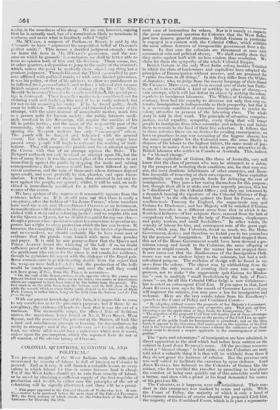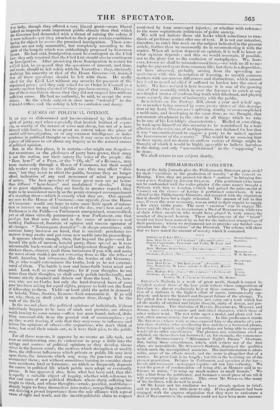COLONIAL QUESTIONS, ECONOMICAL AND POI. IT ICA L.*
Tut: present struggle of the West Indians with the difficulties occasioned by scarcity of labour is full of interest to Colonies in general. End as it mar. it will furnish a valuable lesson to every colony in which labour fir hire is scarce because land is cheap. For if the West Indies should go to ruin from scarcity of labour, or be saved by obtaining a sufficient supply of the first requisite of
i production and wealth, in either case the principles of' the art of colonizing will be signally illustrated, and there will be a promi-
* This paper appeared in the Wotan/ Gazette of Wednesday last. It con- taias matter to be pondered before the next -tugs of the Colonial Passengers Bill; the third reading of which stands on the Order-hook of the llote,e of Commons for Thursday the 18:11.
nent case of instruction for others. Nor is it merely as respect; the great economical question for Colonies that the West Indies just now deserve general attention : British Guiana in particular is engaged in a contest with the Colonial Office, which exhibits the most odious features of irresponsible government from. a dis-
tance. In that case the colonists are threatened at once whit economical ruin and political slavery. We shall readily show that they strive against both with no less wisdom than resolution. We
claim for them the sympathy of the whole Colonial Empire. British Guiana is the only West India colony besides Trinidad in which the class of landowners and capitalists have adopted the principles of Emancipation without reserve, and are prepared for " entire freedom in all things." In this they differ from the Whites of Jamaica ; who, to judge from the recent language of their friend
Sir CIL% amis MIrruAt.ilt, and from several acts of their last Podia- pima, wLli to establish a kind of serfship in place of slavery,—a vain attempt, which will but defeat its object by milking the colon repuisire to immigrant labourers. The Whites of Guiana, on the
contrary, have had the sagacity to discover not only that very ex- tensive immigration is indispensable to their prosperity, but that it is a necessary condition of extensive immigration to render the
colony attractive to persons of the labouring class. The whole story is told in that word. The principle of attraction comprises justice, social equality, sympathy, every thing that will tempt people to immigrate from other countries and colonies, and induce
them to remain in the land of their free selection. It follows that in these colonies there are no devices for evading emancipation, no laws cr practices in any way savouring of the bygone slavery, but the same equal rights for the Coloured man, the same liberty to dispose of his labour to the highest bidder, die same mode of pay- ing wages in money down for work done, as prove attractive to the British labourer who settles in Canada or Australia. This, indeed, is " a blessed change."
But the capitalists of Guiana, like those of' Australia, very well know that the class of persons who may be attracted to a colony by the prospect of bettering their condition, are, for that very rea- son, the most destitute inhabitants of other countries, and there- fore incapable of removing at their own expense. These capitalists accordingly are ready to provide funds for defraying the cost of immigration. They pass a law taxing themselves for this purpose; but, though their all is at stake and time urgently presses, this law
is " disallowed" by the Colonial Office ; and they are informed by a despatch bearing the signature of the Colonial Minister of Eng- land, that " As the silk-trade quitted the East for France, or the woollen-trade Tuscany for England, the sugar-trade may quit Guiana for I lindostan ; and her Majesty will be satisfied if Guiana flourish hereafter in a different sense from that in which it has flourished hitherto—if her subjects there, rescued from the lash of compulsory toil, become, by the help of Providence, shopkeepers and petty traders, and small freeholders." In other words, the scarcity of labour for hire, and consequent ruin of the great capi- talists, which you, the Colonists, dread so much, we, the Home • Government, desire; and therefore we fbrbid you to tax yourselves for the purpose of immigration. If the matter had stopped there, this act of the Home Government would have been deemed a gra- tuitous wrong and insult to the Colonists, the mere offspring of caprice or stupid conceit. But the matter has not stopped there. It now turns out that the disallowance of the Immigration Ordi- nance was not an aimless injury to the colonists, but had a well-
calculated purpose. The evidence of design will be found in our news from the colony. The object was, by withholding from the colonists the only means of averting their own ruin as sugar- growers, not to make " the sugar-trade quit Guiana for Hindos- tan "—not to multiply " small freeholders by the help of Provi- dence"—no, for all this Colonial Office fudge is now withdrawn— but to extort an extravagant Civil List. if you agree to that, Lord Joan Russma. now says by the mouth of Governor LIO1IT—if you
will augment the salaries, you may pass a law for immigration and welcome. Here are the very words, taken from his Excellency's speech to the Court of Policy and Combined Court-
" By adopting without reserve the proposals of her Majesty's Government. you obtain immediate advantages and prospective gain. rhat gain and those advantages are the application or large finals for Immigration," Re. * • • " rejection of the proposed 'ivil List will deprive you of these advantages and gain." * * * " Contiorent on the passing of the Civil List, an appro- priation of the public fluids for Immigration is permitted; and on the other hand, it Appears to the Governor, that contingenton the rejection of the Civil List is the revival of the Crown Revenues without the existence of any finals which could be deemed a surplus applicable to the encouragement of immi- gration."
The "gain and advantages" of immigration are here admitted, in direct opposition to the stuff which had before been written on time subject in Lord Join BroscLis name. All the previous nonsense about a " blessed change" is laid aside, and the Colonists are truly told what a valuable thing it is that will be withheld from them if they do not grant the increase of salaries. But the previous cant was well suited to fheilitate the extortion by open violence. Lord JOUN RUSSELL has behaved to the Colonists of Guiana like the robber, who first terrified the traveller by preaching to him about
the comfbrt of being sent quickly out of this miserable world into a better, and then with a pistol at his head demanded his monQ or his precious life. The Colonists, as it happens, were nit intimidated. Their con- duct in this emergency wits marked by sense and spirit. While the Court of Policy, the majority or which is only a band of Government nominees, of course adopted the proposed Civil List, the majority of the Combined Court, which is in part a representa-
fee body, though they o. ffered a very liberal grant—more liberal indeed as respects some important public objects than that which the Governor had demanded with a threat of ruining the colony if it were refused—yet they attached to their grant certain conditions baring for object to secure the promised immigration. These con- ditions are not only reasonable, but completely according to the spirit of the bargain. which was unblushingly proposed by Governor LIGHT. Ile had said, Immigration must be contingent on the Civil List: they only required that the Civil List should also be contingent on Immigration. After promising them Immigration in return for a Civil List, he proposed that the questions of amount, and time, and mode, should be left solely with the Executive : they, obviously doubting his sincerity or that of the Home Government, insisted that all these questions should be left with them. lie really asked for the Civil List without any security for payment of the stipulated price; and they only asked for an Order in Council as a security against being cheated of their purchase-money. His rejec- tion of their conditions shows that they did not suspect him without sufficient cause. lie had no authority, he said, to accept the con- ditions. So the whole subject is once more "referred" to the Colonial Office, and the colony is left to confusion and decay.



























 Previous page
Previous page